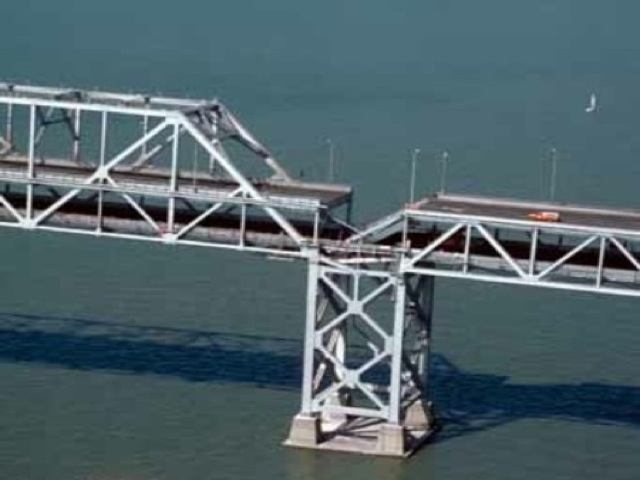A proposal to charge toll in the bridge carpool lane
 |
|
by Irene Marr/PNN Race, Poverty, Media Justice Institute Intern Carpooling. It's fun with friends, saves on gas, AND you're going green. Many have the option to share their vehicular luxury, but for others, it's a way of life. Thousands of Californians rely on sharing gas costs and roadway incentives for adding passengers to their car, not necessarily because they're devoted to "sharing is caring"ideology, but because they can't afford not to. I grew up in Los Angeles, and if you know the "City of Angels", you know that in no way do people have wings and fly--they drive, everywhere. Gas was always an issue, and no matter what people may think, has never been cheap. My friends and I always relied on asking for rides or pitching in on someone's gas tank to go somewhere. For most of us, without this, none of us would have gone anywhere. It's how we went to school and work. It was how we did the things we needed to do 'cause we couldn't afford to buy a car ourselves. My father moved to this country and found himself carpooling from the beginning. He found that it was a way to save on transport costs since he was struggling to establish his new life. Not only that, it's hard to take the bus when you're work is 30 min. by car, up to 45 during rush hour. For the majority of the laborers in California, carpooling is the only way that they'll get to their jobs and contribute to the State's workforce. The State even fosters this notion when providing carpool lanes and waived bridge tolls for carpoolers. From a policy perspective, this decongests the roadways, helps the environment, and encourages mobility. Economically, the State can not afford to lose out on people traveling to their jobs, especially the blue collar ones. As the analyzing archaic duo Matier & Ross reports in the San Francisco Chronicle, the Bay Area Transit Authority is looking towards riders to help seal their $140 million budget by raising the bridge toll and even eliminating the toll waiver for carpoolers. Somewhat compromising, the authority proposes a ˜discount rate to still keep a touch of incentive for those who are riding the eco-friendly cause. What's concerning about this matter isn't that they're hiking up the toll, but who they're squeezing money from. I know for sure that if I were back in L.A., my friends and I would have more of an obstacle getting around. My family and I would struggle incredibly if we had to run around picking up the kids from different schools while running errands without personal vehicles. I also know that the neighboring Beverly Hills would have a lawn and garden crisis. It's hard to fit lawnmowers and weed wackers on a bus, let alone a safety risk. As families and workers who rely on carpooling personal vehicles to fulfill their daily obligations, this proposed toll increase is going to thicken the barrier of transportation obstacles that hinder their means of financial support. On the other side of the income fence, it's a contradiction to doing things the ˜environmental way". Given this, there is definitely an extreme disconnect between what we perceive as "going green". The experience of low income people (who are the majority being of color and migrant) is inherently "green" by default. Low income people are reliant on the carpool factor and therefore gain the right of benefiting from no-cost bridge crossings. In opposition, the higher income population would take from it one more price to pay to be labeled "green". In these times of drive hybrid, eat organic, and other types of "green-washing" campaign, we can see that to be an environmentalist, there are ways to direct your money in order to make help the earth. To carpool and be taxed for it is no different. Those who are inherently green can no longer afford to continue their already helpful ways. It's almost as if carpoolers are being punished in many ways. "For the poor, an increase on tolls is money that can't afford to be taken away", says Vivian Hain, Poverty Scholar and mother of three. "If the toll proposal goes through, I won't be able to come as often. The bridge toll [currently] takes at least a third of my budget. It's the reason why I carpool. If I have to come 2 to 4 times a week, it's not going to work. Gas on top of bridge tolls is going to make it harder for me to do the things I have to do to make ends meet". As victims of American poverty, Vivian and numerous amounts of Bay Area families like hers are going to be limited in their ability to pull themselves out of their financial hardships. If they can't get to work, how are they going to support their families? Not being able to mobilize on the basis of affordability discriminates the impoverished, people of color, and most of all, a population of people who do a hard day's work to survive, support themselves and their families, and serve their societal duty. To instill a policy where financially fragile people are impacted harder is careless and unfair. People like me, Vivian, and Tiny, who rely on tagging along and bringing people along to accomplish deeds needed to just get by are going to have to yet find more ways to survive and make it work. Maybe I'll start asking people with a Prius for a ride next time. |



